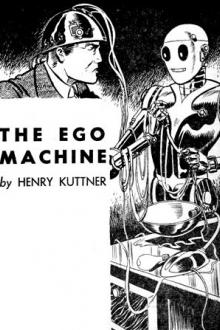The Boy Who Fell from the Sky - Jule Owen (english love story books TXT) 📗

- Author: Jule Owen
- Performer: -
Book online «The Boy Who Fell from the Sky - Jule Owen (english love story books TXT) 📗». Author Jule Owen
Mathew gratefully goes down to the water’s edge, strips down to his underwear, then looks around, shrugs and takes them off as well. Wading thigh-deep, he scrubs himself with the soap and a cloth, scouring off days of grime and sweat. The soap pools around him and forms a line as it’s slowly taken down the river. When he comes into shore, Evgeny offers him a towel and fresh, dry clothes, jungle camouflage like theirs, too big for him. He rolls up the legs of the trousers and his sleeves and ties the waist with some rope Evgeny gives him. Evgeny also finds him fresh clean, dry socks, and Mathew is more grateful than he has felt in a long time.
Evgeny puts out his shoes to dry. Mathew expects them to throw his old clothes on the fire, but crew-cut washes them, dries them in the sun, and then puts them in a bag like they are evidence.
In the afternoon, in his fresh-smelling, clean clothes, no longer hungry or thirsty, he watches the soldiers fish in the river. They score a fine dinner, which they slowly smoke above the fire on greenwood sticks. The light starts to fade.
As they sit around the fire, waiting for the fish to cook, Evgeny teaches Mathew all the soldiers’ names in turn. The gap-toothed man, cleaner and fixer of his wounds, is Abram Salko. There’s a grim-faced man with a well-bushed low brow and a half-day beard, hunched by the fire carving wood with a survival knife. His name is Vladimir Klokov. The soldier who handed crew-cut the phone is older, small, wiry, with greying hair and a lined, sad face, but he smiles at Mathew. His name is Yakov Zarubin. There’s a good-looking blond boy, trying to grow a moustache, called Pavel Folkin, who stands and tests one of the cooking fish.
“Andrei . . .” Evgeny says, pointing to crew-cut.
Crew-cut says something sharply to Evgeny. “His name is Kapral Churkin. Churkin, not Andrei.”
“He wants to be known by his last name?”
“Yes. Only rank and last names here, he says. But I am Evgeny. I have son. Your age. Far away. You understand?”
Mathew nods.
Later, as the fire crackles, some alcoholic liquid is passed around. Mathew takes a sip. It is strong and makes him cough. The soldiers laugh, but not unkindly. He’s a boy, after all.
They string a hammock for him under a mosquito net.
His eyes grow heavy watching the embers glow in the fire.
Monday, 20 June 2472, Siberia
In the morning, there is more fresh water and food: a kind of porridge with something sweet in it. Churkin the crew-cut is on the strange old phone again. The soldiers get busy packing camp. The camp is put away in bags and boxes with military efficiency. It’s all stacked neatly on the stony shore. Then they sit and wait. Salko gap-tooth and Folkin the boy wrestle to pass the time. Others sit around and yell abuse or encouragement; it’s difficult for Mathew to tell which.
Then Zarubin shouts and points. A boat is coming along the river. It’s a military vehicle, wide and flat-bottomed, big enough to carry Churkin’s small outfit and all their stuff, pushed along by a powerful engine. It is also sheltered, with a canvas canopy, a necessity in the climate.
Once they’ve loaded and pushed off, Mathew sits at the front watching Evgeny preparing lunch for the others while they travel. Evgeny hands him some cans and a can opener.
“Here,” he starts one off.
Mathew nods, “I know.” He has done this in an old game loosely based on a twentieth-century war. As he opens the cans, he passes them to Evgeny, who’s spreading paste onto biscuits, which he puts in metal bowls and hands round the men. Klokov takes a bite and spits his mouthful over the side of the boat, complaining loudly at Evgeny. Evgeny says something back to the man, who takes offence and stands. Churkin yells at him, and he sits down, reluctantly.
Evgeny glances at Mathew and grunts. “Hard ass,” he says, meaning Klokov.
Mathew grins, eating his biscuits happily, still grateful for anything not banana.
“Where are we going?” Mathew asks.
“Home,” Evgeny says. Then he thinks. “No. Not home. Base camp.”
“Where are we?”
“You don’t know?”
Mathew shakes his head.
“How did you get here?”
Mathew shrugs. How to explain?
“You better have story when get to base camp. You better have good story.”
“Why?”
“Dragomirov.”
Churkin bawls something at Evgeny, who replies deferentially and turns to deal with the empty tins.
“But how do I compose a good story if I don’t know where I am?” Mathew says to Evgeny.
Evgeny puts his finger to his lips and indicates Churkin watching them.
For the rest of the journey, Evgeny won’t do more than grunt at Mathew, passing him water and food, but speaking loudly only in Russian, glancing all the time at Churkin like a dog waiting to be kicked by its master.
As they round a bend, on a wide stretch of water, a clearing, a small village, comes into view, smoke billowing from fires and chimneys in thatched-roof wooden houses. People working on the bank spot the boat and start to call. Others gather on the wooden jetty, where a number of other boats are secured. In the boat, Churkin starts giving orders. Klokov and Folkin come to where Mathew is sitting. They pull him to his feet and roughly turn him around.
Metal circles his wrists. He’s being handcuffed. They stand with him at the front of the boat as it draws in to shore. Zarubin hops onto the bow, carrying a rope. He jumps onto the jetty, pulls them in with the rope, and ties it fast. Klokov and Folkin push Mathew forward. He nearly slips and falls without arms to balance. Klokov holds him up and all but lifts him onto the jetty. They wait while Churkin gets off. Evgeny comes ashore carrying a case of food. Bending to put the case on the floor near Mathew, he whispers as he stands, “We’re in Chukotka. We’re in Siberia.”
Klokov gives the cook a shove, says something, and Evgeny goes back into the boat to continue to unload. Churkin arrives, and they start to walk along the jetty.
As they go into the village, people stop and peer from their work. All the people here are men, and they’re all in uniform.
The base camp is in a clearing in the jungle. They walk along a makeshift runway with a windsock at the end of a tall pole and a helipad. There’s a large, open-sided building with benches in it and a number of wooden huts with banana-leaf thatches.
Mathew is taken to one of these smaller huts and hustled through the door, boots loud on the raised wooden floor. There’s a short corridor with a chair in it and two rooms with their doors open. Klokov shoves Mathew inside the second room, shuts the door and locks it behind him.
There’s nothing in the room but a low wooden bed pushed against a wall. The walls are lime-washed mud and straw. The floor is wooden, dry and clean. The room is spotless. There’s one narrow window letting in bright sunlight, but it’s too high up to see out of. It’s cool in the room, and Mathew is cold. He hasn’t felt cold in days. He grabs the thin blanket off the bed and wraps it around his shoulders.
Then there is nothing to do but sit and wait.
He uses the time to think of a story, like Evgeny told him. Why would he be in Siberia?
This is the strangest game I have ever played. Siberia isn’t anything like this. I saw on the news only a few months ago that it’s uninhabitable because of all the methane from the melting permafrost. But this is a game, and the game requires me to invent a story.
Thinking hard, he starts to invent.
The door unlocks, a man comes in, and the door locks behind him. He is balding, with a salt-and-pepper moustache, and wears a uniform with a red cross sewn on his sleeve. He is carrying a medical bag, which he puts on the floor and opens. Without comment or introduction, he gets straight to business. Brusquely gripping Mathew’s arm, he examines the wound. He pours liquid onto some cotton wool, and Mathew gasps and flinches as the doctor swabs the weeping skin. The man grips his shoulder more tightly and holds it in place as he continues to work, using a device unfamiliar to Mathew to stitch the wound, and redresses it.
Once he has finished with Mathew’s injuries, the doctor takes an electrical device from the bag on the floor. Pushing Mathew’s head forward, he runs the device across the skin at the back of his neck. There is a beep. The man stands back, punches keys on the device, reads something, looks at Mathew suspiciously, and then peers at the device again, punching some more buttons. The machine beeps again. He repeats the exercise, pushing Mathew’s head down, frowning at the screen, displeased. Doing the whole thing one more time makes him no happier. Standing and stepping quickly across the room, he briskly bangs on the door. The door is unlocked, and the doctor leaves. Mathew is alone again.
Much later, the light from the high window is still bright. The guard comes into the room and places a chair in the middle of the empty floor, a few feet away from the bed, and leaves the room without having once looked at Mathew, slamming the bolt behind him.
Several minutes pass before the door opens again.
A new man comes into the room and sits down on the chair, facing Mathew. Short in stature, he is slight, not muscular, but something in his body language carries such aggression and malice that Mathew is immediately on his guard. He has a thick mat of dark hair, the type that forms into springy curls if it isn’t kept short, small black angry eyes, and an expression of utter contempt. Leaning forward, his elbows on his knees, he assesses his prisoner like a spider contemplating breakfast, finally saying in accentless English, “So, you are Mathew Erlang?”
“Yes,” Mathew croaks. His throat is terribly dry.
“I am Polkovnik Grigory Dragomirov. Colonel Dragomirov.” The man’s eyes are hard, unblinking. “You don’t speak a word of Russian?”
“Not without a simultaneous translation plug-in to my e-Pin, no.”
“We don’t use simultaneous translation devices here,” the man says, leaning back, getting comfortable. “Firstly, they tend to break easily because of the extreme humidity. Secondly, we don’t need them, because we all speak Russian.”
Dragomirov sits back in his chair, stretching his neck, gazing at the ceiling. He closes his eyes and sighs.
“Why would an English or Japanese boy . . . what are you again?”
“I’m English.”
“I’m surprised you didn’t try to say you were Chinese, which would at least make some sense. So why would a boy with English credentials be wandering around in the jungle in northeast Siberia?” He seems to be genuinely engaged in puzzling this out, trying to glean the answer from the ceiling. Then he drops his head and stares directly at Mathew. “Do you know?”
“I was – I am – travelling with my father. He’s a research scientist.” Mathew hears the question in his tone. It doesn’t sound convincing even to himself.





Comments (0)